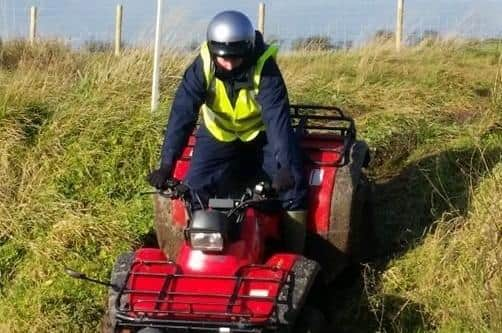Are you legally compliant when using an ATV on the farm?
and live on Freeview channel 276
Quads are often lightweight, versatile vehicles that have been designed to cope with a wide variety of terrain types, using a range of attachments.
These vehicles are intended to be used by a single operator, with a seat that has been designed to be straddled by the operator, allowing them room to position themselves depending on the terrain they are driving on.
Advertisement
Advertisement
There should never be an additional passenger on the vehicle.


The recommended age for driving a quad on the farm is 16 years. Driving on a public road is prohibited unless you have:
r A driving licence
r Category AM for a 16 year old
r Full category B for over 17 years old
r Third party insurance
r Number plates
r Vehicle tax
r Lights
r Reflectors
r Helmet
There is a legal requirement that employers should provide adequate training for employees who use quads, and to make sure that only employees who have received appropriate training are permitted to ride them. The same requirements apply to self-employed people. (https://www.hse.gov.uk/pubns/ais33.pdf). A helmet must be worn when driving a quad.
To ensure you are legally compliant with regards to training, Lantra offers courses that provide the essential knowledge and skills required to operate a quad. The Lantra Awards All-Terrain Vehicle - Sit Astride course is a mix of theory and practice, starting with a detailed look at key health and safety issues; the course also covers the key fundamentals of driving, loading, route planning, stopping, and starting the machine, and the limitations of the machine. This is an assessed training course which allows the user to gain an industry recognised certificate.
Advertisement
Advertisement
Lantra director, Paula Smyth stated: “It’s vital that anyone driving a quad has received adequate training and knows how to do the tasks that are required of them. Wearing a helmet, as well as being a legal requirement, can be a life saver if an accident occurs.
“As an affiliate member of the Farm Safety Partnership (FSP), Lantra is also keen to reinforce the farm safety campaign, ‘Stop and Think SAFE’, encouraging farmers and users of quads to stop and think about the four main farm hazards; slurry, animals, falls and equipment (SAFE). I would encourage everyone driving a quad to think SAFE before undertaking any job using this vehicle.”
Common accidents caused by quads includes:
r Being thrown off due to the vehicle overturning or after losing control
r Collision with structures, such as a tree or another vehicle
Advertisement
Advertisement
r Being trapped by an overturned vehicle/asphyxiated under an overturned machine
r Pedestrians being hit by a moving vehicle
Many of these accidents can be avoided as they are often due to factors, such as:
r Lack of formal training/experience
r Incorrect/lack of head protection
r Excessive speed
r Carrying a passenger
r Unbalanced loads or overloading
r Loss of control
r Age of the operator
By ensuring you follow a few simple guidelines, such as those below, you can reduce the risk of an accident or injury:
r Ensure you have received the appropriate training to use the vehicle
Advertisement
Advertisement
r Always wear a helmet (many quad fatalities are caused by head injuries; helmets would almost certainly have prevented these deaths).
r Wear appropriate PPE, including clothing that covers your arms and legs, sturdy footwear, a visor, and gloves (particularly during cold weather)
Additional safety tips that can be applied when using a quad include:
r Parking – if you need to park on a slope, park across it, unless it’s too steep
Advertisement
Advertisement
r Ensure your quad is properly maintained and kept in a safe condition
r Never exceed the capabilities of the quad
r Don’t undertake tasks that interfere with safe riding – keep both hands on the handlebars
r Never ever take a passenger on the vehicle!
If you would like any additional information about using ATV’s visit the HSENI website at: https://www.hseni.gov.uk/articles/quad-bike-safety. To find out more about Lantra’s training course and a Provider offering this training visit: https://www.lantra.co.uk/course/all-terrain-vehicle-sit-astride or contact Lantra’s Northern Ireland office at [email protected] / 07867908171.